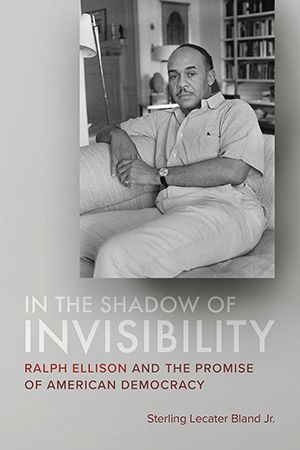
312 pages / 6.00 x 9.00 inches / 17 halftones
Literary Criticism / American | Literary Criticism / African American | Social Studies / African-American History
With In the Shadow of Invisibility, Sterling Lecater Bland Jr. offers a long-overdue reconsideration of Ralph Ellison, examining the trajectory of his intellectual thought in relation to its resonances in twenty-first-century American culture. Bland charts Ellison’s evolving attitudes on several central topics including democracy, race, identity, social community, place, and political expression. This compelling new exploration of Ellison’s legacy stresses the perpetual need to reexamine the intersections of race, literature, and American culture, with particular attention to how the democratic principle has grown increasingly urgent in the nation’s ongoing, and often contentious, conversations about race.
Arguing that Ellison saw racial and social identity as being inseparable from the nation’s past and its complicated history of racial anxiety, In the Shadow of Invisibility traces the growth and transformation of Ellison’s ideas across his life and work, from his early apprentice writing that culminated in his groundbreaking first novel, Invisible Man, through the posthumous publication of his unfinished second novel, Three Days before the Shooting . . . Focused on his mythic vision of the promise of America, this book firmly situates Ellison in the sociopolitical environments from which his ideas arose, with close consideration of his published writings, including his influential essays on literature and jazz, as well as his working notes and correspondence. Bland foregrounds Ellison’s thinking on the responsibilities of Black writers to examine democratic ideals, the legacies of slavery and Jim Crow, and the impacts of civil rights movements.
Interweaving biography, history, and literary criticism, and drawing from extensive archival research, In the Shadow of Invisibility reveals the extent to which Ellison’s work exposes the contradictions inherent in American culture, arguing anew for the importance and immediacy of his writings in the broader context of American intellectual thought.
Sterling Lecater Bland Jr. is professor of English, African American studies, and American studies at Rutgers University–Newark. He is the author of Voices of the Fugitives: Runaway Slave Stories and Their Fictions of Self-Creation and the editor of Understanding 19th-Century Slave Narratives and the three-volume African American Slave Narratives: An Anthology.
“As a Black artist and intellectual, Ralph Ellison’s chief preoccupation was with the world-transforming creativity of Black American culture and its relationship to creating American identity and history. Ellison’s position was that there is no America or American culture without the work of the slaves and their descendants and that, in a very real sense, without the Black American experience, the idea of being or becoming American is impossible to understand. The great value of Sterling Bland’s knowledgeable, well-written study is that, in the age of MAGA and George Floyd, it reminds us of Ellison’s continuing relevance and importance for understanding contemporary American conflicts—he remains as vital as Toni Morrison, James Baldwin, Ta-Nehisi Coates, or a Louis Armstrong solo.”—Timothy Parrish, author of Ralph Ellison and the Genius of America
“As wide-ranging in its scope as it is precise in its analysis, In the Shadow of Invisibility offers a compelling new intellectual portrait of Ralph Ellison. Sterling Lecater Bland Jr. poses fundamental questions about Ellison’s place in American literary and cultural history, and urges us to rethink his relationship with, and contributions to, central narratives about national identity.”—Sam V. H. Reese, author of Blue Notes: Jazz, Literature, and Loneliness
"The conversation surrounding Ralph Ellison (1914–94) has been going on for more than 70 years. . . . Bland enters the conversation in the spaces left unfilled by others—the proverbial invisible space. . . . To read Bland is to see Ellison in a new light 71 years later."—CHOICE
Found an Error? Tell us about it.